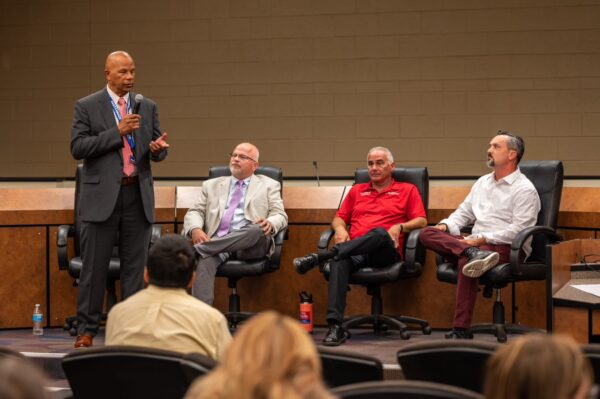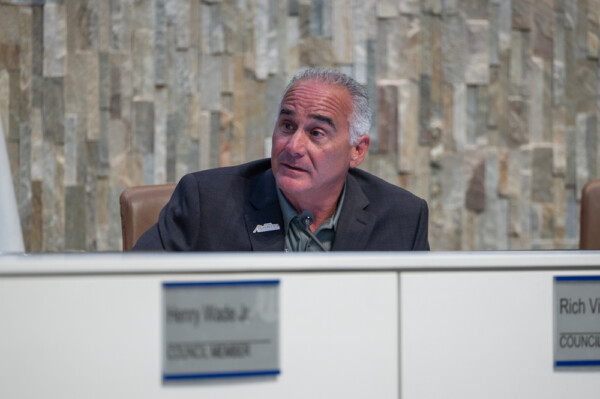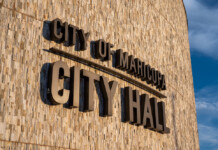The 2022 Maricopa primary election was memorable for many reasons.
It took nine days after Election Day for Pinal County to announce a Logic and Accuracy test of results was certified and witnessed by political observers from both Republican and Democrat parties.
That certification cleared the way for Maricopa City Council to canvass results of the City Council race on Aug. 16.
Voters cast 17,860 ballots and the three incumbents retained their seats, with Rich Vitiello garnering 5,028 votes, Vincent Manfredi 4,774 and Henry Wade 4,373. Challenger Adam Leach came up short with 3,579 votes.
The incumbents received enough votes to be elected outright and avert a runoff in November.
Trouble arises
That must have been a relief after the county’s grossly mismanaged primary election started weeks earlier with a mass printing error on ballots.
On July 7 it became clear municipal races were left off early ballots mailed to some county voters.
The Pinal County Elections Department made this statement:
“The County has been made aware of issues with some early ballots not reflecting the correct city and town election races. County Election and Recorder staff are working hard to identify the scale of the issue.”
The issue, at first, appeared to affect only Apache Junction and Superior. The next morning, however, ballots in Maricopa and Casa Grande were found to have omitted local elections. Later reports showed the problems extended to Eloy, Queen Creek and Mammoth.
About 63,000 ballots were affected countywide, including those sent to about 13,500 Maricopa voters in six precincts.
In an email, James Daniels, Pinal County’s director of communications, said efforts were ongoing to rectify the issue.
“Working with the Secretary of State’s Office and our County Attorney’s Office, we are currently looking at a solution for voters in impacted areas to be sent a supplemental ballot specifically for their city/town contest,” he said at the time.
The county’s initial fix was to require mail-ballots — no in-person voting — for the municipal elections in the affected cities.

In effect, voters would have to vote twice — with two separate ballots.
It was confusing to say the least.
But over the next week, public outrage erupted over the plan to eliminate in-person voting for the local elections.
The county’s first move to remedy the problem was to reach out to each voter it could, Daniels explained at the time: “We will be attempting to directly contact voters in this instance where their phone number is available to let them know this and to expect the supplemental ballot.”
The final answer
Enough people were upset about not being able to vote in-person for their municipal candidates that the county reversed course.
On July 12, the Pinal County Board of Supervisors met to discuss the problems and unanimously approved a new solution.
Voters in Maricopa and the other six affected cities would receive a supplemental ballot solely for local elections — whether they voted early or at their polling place on Election Day. The original ballot would still be counted for federal, statewide and legislative elections. The two ballots would be counted on separate machines. (In-person voters not in one of the affected precincts would receive a single ballot.)
County Attorney Kent Volkmer said the in-person voting process would be familiar to affected voters.
“The in-person is really going to be pretty standard other than you’re getting two different ballots,” he said. “You’ll have to sign two different books instead of one. There will be two different locations within the same (area) but otherwise, it will be the same process that an ordinary voter is used to.”
The supplemental ballots were visually different from the original ballots — with an orange stripe — to help ensure ballots would not be counted twice.
At the suggestion of Vice Chair Jeff Serdy, the board decided to allow candidates in municipal contests to request a hand count to ensure accuracy of the count.
State Rep. Teresa Martinez (R-Casa Grande) said such a provision could be important in the local elections.
“I can see some city council races being very close and some candidates wanting to challenge based on the error,” she said at the time.
Pinal supervisors had rejected two other options to fix the situation.
The first was to convert all municipal elections to mail-only voting. Volkmer said the affected cities rejected that solution because it would violate the county’s Intergovernmental Agreements with them to run municipal elections.
Volkmer said: “The overarching message (from the affected cities) was, ‘We didn’t authorize it, we don’t want that, our people need to be able to go in and vote in person. If we convert to an all-mail, we would eliminate that availability.’”
A second option was to hold special municipal elections at a later date in the affected cities. Concerns over historically lower voter turnout in special elections derailed that alternative.
Pinal County Manager Leo Lew said county staff would do whatever it took to ensure the election went off smoothly and accurately.
Elections Director David Frisk took responsibility for the errors. Hired in March as the third elections director in two years, he came to a department with a staff of one, instead of the five full-time workers it should have had.
“Thorough proofing would have prevented this error,” Frisk said. “This was not a system glitch or computer error or anything nefarious. There is no fault of anyone in the Recorder’s Office — it was my mistake. I and my staff are prepared to do whatever we need to do to fix this.”
Troubles continue
The problems didn’t end with the ballot snafu.

As a result, Pinal County printed additional ballots at the last minute. The county released this statement at 5:50 p.m.:
“Due to unprecedented demand for in-person ballots, Pinal County has experienced a ballot shortage in certain, limited precincts. Pinal County is continuing to print additional ballots and distributing them to each affected precinct polling place.”
The county advised voters who experienced an issue they could use the Express Vote device at their polling place. Otherwise, the county said as long as voters were physically in line by 7 p.m., they would be permitted to cast a ballot.
Some Maricopa voters claimed they were refused supplemental ballots by poll workers, preventing them from voting in the City Council election. At the Province poll, supplemental ballots were not distributed until 5:30 p.m. despite polls opening nearly 12 hours earlier.
In the days after the election, Maricopa Councilmember Nancy Smith, now the city’s mayor, said she was unhappy with the circumstances.
“It is really disappointing because we thought all eyes were on these processes since the original (ballot omission) issue a month ago,” Smith said. “And to find out all the teams don’t have the right information and have denied the opportunity to citizens to vote for council is really a letdown. Every voter needs to have the right to vote in all cases and they were denied that right today.”
Smith said she understood the issue was confined to one polling place, at the Veterans Center near Province, and was rectified about 5:30 p.m. “It’s pretty obvious we need to figure out some new processes,” she said.
Asked if she thought the issues could lead to candidates contesting the election results, Smith said, “It depends on the outcome and how close different elections are. If it’s really close, that could happen. If the margins are wide, I wouldn’t think so.”
Then-Interim Mayor Vincent Manfredi, who was re-elected in the primary, was also displeased with the Election Day issues given the initial ballot omissions.
“It is ridiculous that with a month to fix this situation, we had workers at our polling stations not handing out supplemental ballots,” Manfredi said before the results in his race were tabulated and announced.
The fallout
Three days after the primary, the Pinal County Board of Supervisors began to make staffing changes to address the incompetence in the Elections Department.
Frisk was out. Pinal County Recorder Virginia Ross stepped down to become the new elections director “to restore confidence for voters in the November Election,” the supervisors said in a statement. Dana Lewis was appointed the new Pinal County Recorder through 2024.
In appointing Lewis, Supervisors Chairman Jeffrey McClure pointed to her “thorough understanding of how elections in Arizona function, which I believe is crucial for the role of Recorder.”
As Recorder, Ross did not oversee the Elections Department for the primary. She did lead Pinal County Elections during her first term in 2014 and 2016, but with the county’s growth and an increase in Recorder responsibilities, an elections director was brought in to oversee the department in 2017. Since that time, Elections has reported to county management, which is overseen by the supervisors.
Weeks after the election, Ross told the Board that in her initial research into what went wrong on Election Day, she found flawed logic assumptions in the formula that was used to calculate the number of ballots that were ordered for polling sites on Election Day. She confirmed that both parties ran out of ballots. She also highlighted a lack of hands-on training for poll workers.
Ross and Lewis also presented to the Board a new Organizational chart for the Elections and Recorder’s Departments. This would see five staff members added to the Elections Department, including two Deputy Directors.
McClure said he and the board were “deeply embarrassed” and frustrated by the mistakes.
“We are taking immediate steps to ensure the November election runs smoothly, as elections in Pinal County have historically done prior to this primary,” he said in a statement.
“It is vital that we restore trust with Pinal County voters, and I can assure the community that there is no better leader to take control of our Elections Department than Virginia Ross,” McClure continued. “As a fellow elected official, I am grateful to Virginia for sacrificing her elected role to answer the needs of Pinal County.”
The general election is Nov. 8.
Editor’s Note: Vincent Manfredi is an owner of InMaricopa.

![Mayor Nancy Smith, who at the time of this photo was a councilmember, holds a mail-in ballot during a discussion about the election problems during at City Council meeting in July. She traveled to Florence the day after the primary to tell the Pinal County Supervisors that the election was an embarrassment. [Bryan Mordt]](https://www.inmaricopa.com/wp-content/uploads/2022/07/BCM_7393.jpg)
![City gave new manager big low-interest home loan City Manager Ben Bitter speaks during a Chamber of Commerce event at Global Water Resources on April 11, 2024. Bitter discussed the current state of economic development in Maricopa, as well as hinting at lowering property tax rates again. [Monica D. Spencer]](https://www.inmaricopa.com/wp-content/uploads/2024/04/spencer-041124-ben-bitter-chamber-property-taxes-web-218x150.jpg)
![3 things to know about the new city budget Vice Mayor Amber Liermann and Councilmember Eric Goettl review parts of the city's 2024 operational budget with Mayor Nancy Smith on April 24, 2024. [Monica D. Spencer]](https://www.inmaricopa.com/wp-content/uploads/2024/04/spencer-042424-preliminary-budget-meeting-web-218x150.jpg)




![Elena Trails releases home renderings An image of one of 56 elevation renderings submitted to Maricopa's planning department for the Elena Trails subdivison. The developer plans to construct 14 different floor plans, with four elevation styles per plan. [City of Maricopa]](https://www.inmaricopa.com/wp-content/uploads/2024/04/city-041724-elena-trails-rendering-218x150.jpg)
![Affordable apartments planned near ‘Restaurant Row’ A blue square highlights the area of the proposed affordable housing development and "Restaurant Row" sitting south of city hall and the Maricopa Police Department. Preliminary architectural drawings were not yet available. [City of Maricopa]](https://www.inmaricopa.com/wp-content/uploads/2024/04/041724-affordable-housing-project-restaurant-row-218x150.jpg)



![Alleged car thief released without charges Phoenix police stop a stolen vehicle on April 20, 2024. [Facebook]](https://www.inmaricopa.com/wp-content/uploads/2024/04/IMG_5040-218x150.jpg)

![City gave new manager big low-interest home loan City Manager Ben Bitter speaks during a Chamber of Commerce event at Global Water Resources on April 11, 2024. Bitter discussed the current state of economic development in Maricopa, as well as hinting at lowering property tax rates again. [Monica D. Spencer]](https://www.inmaricopa.com/wp-content/uploads/2024/04/spencer-041124-ben-bitter-chamber-property-taxes-web-100x70.jpg)

![3 things to know about the new city budget Vice Mayor Amber Liermann and Councilmember Eric Goettl review parts of the city's 2024 operational budget with Mayor Nancy Smith on April 24, 2024. [Monica D. Spencer]](https://www.inmaricopa.com/wp-content/uploads/2024/04/spencer-042424-preliminary-budget-meeting-web-100x70.jpg)

Warning!! This is a negative comment. You’ve been informed. I bet this election was just to get us primed and ready for a completely fraudulent and corrupt election that is coming this November. So when November comes, it will be just another screwed up election, but leaning for the current people in power. I suspect this comment won’t even make it to the website. “Case in point!”.